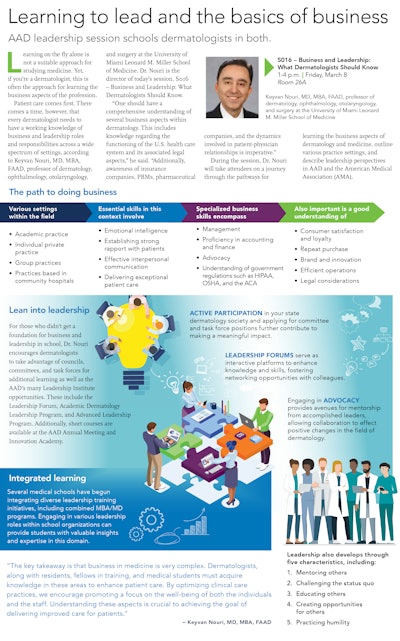Learning to lead and the basics of business
AAD leadership session schools dermatologists in both.

S016 – Business and Leadership: What Dermatologists Should Know
1-4 p.m. | Friday, March 8
Room 26A
Learning on the fly alone is not a suitable approach for studying medicine. Yet, if you’re a dermatologist, this is often the approach for learning the business aspects of the profession.
Patient care comes first. There comes a time, however, that every dermatologist needs to have a working knowledge of business and leadership roles and responsibilities across a wide spectrum of settings, according to Keyvan Nouri, MD, MBA, FAAD, professor of dermatology, ophthalmology, otolaryngology, and surgery at the University of Miami Leonard M. Miller School of Medicine. Dr. Nouri is the director of today’s session, S016 – Business and Leadership: What Dermatologists Should Know.
“One should have a comprehensive understanding of several business aspects within dermatology. This includes knowledge regarding the functioning of the U.S. health care system and its associated legal aspects,” he said. “Additionally, awareness of insurance companies, PBMs, pharmaceutical companies, and the dynamics involved in patient-physician relationships is imperative.”
During the session, Dr. Nouri will take attendees on a journey through the pathways for learning the business aspects of dermatology and medicine, outline various practice settings, and describe leadership perspectives in AAD and the American Medical Association (AMA).
The path to doing business
Various settings within the field
- Academic practice
- Individual private practice
- Group practices
- Practices based in community hospitals
Essential skills in this context involve
- Emotional intelligence
- Establishing strong rapport with patients
- Effective interpersonal communication
- Delivering exceptional patient care
Specialized business skills encompass
- Management
- Proficiency in accounting and finance
- Advocacy
- Understanding of government regulations such as HIPAA, OSHA, and the ACA
Also important is a good understanding of
- Consumer satisfaction and loyalty
- Repeat purchase
- Brand and innovation
- Efficient operations
- Legal considerations
Lean into leadership
For those who didn’t get a foundation for business and leadership in school, Dr. Nouri encourages dermatologists to take advantage of councils, committees, and task forces for additional learning as well as the AAD’s many Leadership Institute opportunities. These include the Leadership Forum, Academic Dermatology Leadership Program, and Advanced Leadership Program. Additionally, short courses are available at the AAD Annual Meeting and Innovation Academy.
Active participation in your state dermatology society and applying for committee and task force positions further contribute to making a meaningful impact.
Leadership forums serve as interactive platforms to enhance knowledge and skills, fostering networking opportunities with colleagues.
Engaging in advocacy provides avenues for mentorship from accomplished leaders, allowing collaboration to effect positive changes in the field of dermatology.
Leadership also develops through five characteristics, including:
- Mentoring others
- Challenging the status quo
- Educating others
- Creating opportunities for others
- Practicing humility
Several medical schools have begun integrating diverse leadership training initiatives, including combined MBA/MD programs. Engaging in various leadership roles within school organizations can provide students with valuable insights and expertise in this domain.
“The key takeaway is that business in medicine is very complex. Dermatologists, along with residents, fellows in training, and medical students must acquire knowledge in these areas to enhance patient care. By optimizing clinical care practices, we encourage promoting a focus on the well-being of both the individuals and the staff. Understanding these aspects is crucial to achieving the goal of delivering improved care for patients.”
– Keyvan Nouri, MD, MBA, FAAD












